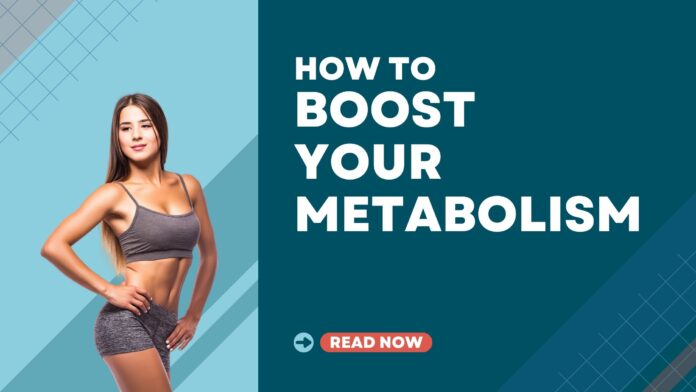Last Updated on August 29, 2023 by Shane Corbitt
Introduction
Brief explanation of metabolism and its importance
Metabolism is a fundamental process that occurs in every living organism, including humans. Put simply, it’s the way our bodies convert food into energy to fuel various bodily functions. It encompasses all the chemical reactions happening inside us that keep us alive and functioning optimally.
From breathing and digesting food to repairing cells and eliminating waste, metabolism plays a vital role in maintaining homeostasis. Understanding how metabolism works is key to realizing its significance.
Our bodies require a certain amount of energy to perform basic functions even when at rest – this is known as the basal metabolic rate (BMR). Additionally, we burn calories through physical activities and exercise, contributing to total energy expenditure.
Mention the benefits of a boosted metabolism
A faster metabolic rate brings with it several appealing benefits that go beyond weight management. Firstly, an efficient metabolism aids in burning calories more effectively, which can be beneficial for weight loss or maintaining a healthy weight.
When your body efficiently converts food into energy, there’s less chance for excess calories to be stored as fat. Furthermore, an elevated metabolic rate can enhance your overall energy levels throughout the day.
By efficiently converting nutrients into usable fuel for your body’s needs, you’ll experience increased vitality and improved endurance during physical activities. Additionally, boosting your metabolism can positively impact your mental clarity and focus.
A well-functioning metabolic system ensures that adequate nutrients reach your brain cells swiftly so they can perform optimally. A revved-up metabolism promotes better digestion and nutrient absorption.
This means you’ll derive more benefits from the food you consume since nutrients will be properly utilized by your body’s tissues and organs. Understanding what metabolism entails provides valuable insights into how our bodies function on a cellular level.
A boosted metabolism offers numerous advantages, such as effective calorie burn, heightened energy levels, improved mental acuity, and enhanced nutrient absorption. In the following sections, we’ll delve deeper into the mechanics of metabolism and explore strategies to optimize it naturally.

Understanding Metabolism
Definition and Explanation of Metabolism
Metabolism is a term often used when discussing health and weight management, but what does it mean? Simply put, metabolism refers to the chemical processes that occur within our bodies to convert food into energy.
It’s the engine that keeps us going, powering everything from breathing and digestion to muscle movement and cell repair. Without metabolism, life as we know it would not be possible.
Differentiating Between Basal Metabolic Rate (BMR) and Resting Metabolic Rate (RMR)
When talking about metabolism, two commonly used terms are Basal Metabolic Rate (BMR) and Resting Metabolic Rate (RMR). While they are similar in concept, the two have slight differences.
BMR specifically represents the number of calories your body needs to perform essential functions while at complete rest. It measures the energy required for vital bodily processes like maintaining body temperature, circulating blood, or supporting organ function.
On the other hand, RMR considers your BMR and additional calories burned during light physical activities like sitting or standing. RMR provides a more accurate estimate of how many calories your body needs each day when factoring in these minimal movements.
Factors Influencing Metabolism
Metabolism is influenced by several factors that differ from person to person. Age plays a crucial role as metabolic rate tends to decrease with each passing year due to loss of muscle mass and hormonal changes. Gender also affects metabolism since men typically have higher muscle mass and lower body fat percentage than women, leading to a slightly faster metabolic rate.
Genetics can also influence metabolism as some individuals inherit genes that affect how their bodies process specific nutrients or regulate hormone levels related to metabolism. Muscle mass significantly impacts metabolic rate since muscle tissue requires more energy to maintain than fat.
Therefore, individuals with more muscle mass tend to have a higher metabolism even at rest. Understanding these various factors that influence metabolism is vital as it helps us grasp our body’s unique needs and how we can make lifestyle adjustments to optimize our metabolic function.
The Role of Diet in Boosting Metabolism
Importance of Balanced Meals and Portion Control
When it comes to revving up your metabolism, what you put on your plate plays a crucial role. Opting for balanced meals that include a variety of nutrients is key. To keep your metabolic fire burning, make sure to include lean proteins like chicken, fish, tofu, or beans in every meal.
Protein requires more digestion energy than carbs or fats, thus boosting your metabolic rate. Additionally, protein helps with muscle repair and growth, which further enhances metabolism.
Equally important is portion control. While it’s tempting to pile up our plates with too much food, it’s essential to listen to our bodies and consume the right amount.
Overeating can lead to excess calorie intake that may slow down our metabolism in the long run. Practicing mindful eating by savoring each bite and stopping when you feel satisfied can be beneficial for maintaining a healthy weight and supporting an efficient metabolism.
Discussing Macronutrients – Proteins, Carbohydrates, and Fats – and their Impact on Metabolism
Let’s dive deeper into the three macronutrients and understand how they influence our metabolism: Proteins: Apart from their role in muscle growth mentioned earlier, proteins have a high thermic effect on food (TEF). TEF refers to the energy required during digestion and absorption of nutrients.
Protein has the highest TEF among macronutrients because it takes more effort for our bodies to break it down into amino acids. By incorporating protein-rich foods into your diet, like lean meats, eggs, dairy products, or plant-based alternatives like lentils or quinoa, you’re giving your metabolism a little boost after each meal.
Carbohydrates: Carbs often get a bad rap when it comes to weight management, but they are essential for energy production. The key lies in choosing the right kind of carbs – whole grains, fruits, vegetables, and legumes instead of refined sugars and white flour products.
Your body needs carbohydrates to function optimally, and they provide a source of fuel for workouts and daily activities. Consuming adequate amounts of complex carbohydrates can ensure your metabolism works efficiently.
Fats: Contrary to popular belief, fats are not the enemy! Healthy fats such as avocados, olive oil, nuts, and seeds are essential for hormone production and absorption of fat-soluble vitamins.
They also help regulate insulin levels, aiding in blood sugar control. Including moderate amounts of healthy fats in your diet can help keep you satiated longer and prevent overeating.


Highlighting the Thermic Effect of Food (TEF) and its Role in Boosting Metabolism
Ever wondered why some foods make you feel hotter or more energized after eating? That’s because of the thermic effect of food (TEF).
TEF refers to the calories expended during digestion and is influenced by the composition of macronutrients in a meal. Protein-rich foods have a higher TEF compared to carbohydrates or fats.
This means that consuming protein requires more energy to digest and absorb, thus increasing your metabolic rate temporarily. While protein has the highest TEF at around 20-30%, carbohydrates have a TEF ranging from 5-10%, while fats have a lower TEF at around 2-3%.
However, it’s important to note that overall calorie intake still plays a significant role in weight management despite these differences. Incorporating a mix of all three macronutrients into your meals can optimize the thermic effect on your metabolism.
By focusing on balanced meals composed of lean proteins, complex carbs, and healthy fats while practicing portion control, you can support an efficient metabolism that works in your favor. Additionally, being mindful of the thermic effect of food can help you make smarter choices and brighten your metabolic fire.
Physical Activity for a Revved-up Metabolism
Exploring the benefits of regular exercise on metabolic rate
Regular exercise is your secret weapon when it comes to boosting your metabolism. Not only does it have numerous health benefits, but it also revs up your metabolic rate, helping you burn calories more efficiently.
Engaging in physical activity increases your energy expenditure, causing your body to utilize more calories even at rest. So, lace up those sneakers and dive into the amazing benefits of exercise!
Aerobic exercises: How they increase heart rate and calorie burn during workouts
Aerobic exercises are like the superheroes of boosting metabolism. Running, swimming, cycling, or even brisk walking get your heart pumping and your blood flowing!
As you engage in aerobic exercises, your heart rate increases significantly. This rise in heart rate leads to an elevated calorie burn during and after the workout.
In fact, studies have shown that high-intensity aerobic exercises can keep burning calories even hours after you’ve finished sweating it out! So next time you’re looking for a powerful way to boost that metabolism of yours, put on some upbeat tunes and hit the pavement with a jog or jump into a fun Zumba class.
Resistance training: how it builds lean muscle mass that enhances metabolism even at rest
If you want to push your metabolism while toning up those muscles, resistance training is where it’s at! Engaging in resistance exercises like lifting weights or using resistance bands stimulates muscle growth and development. As muscles grow stronger and leaner through resistance training, they require more energy for maintenance.
This means that even when you’re not actively exercising—while binge-watching your favorite series or enjoying a well-deserved nap—your resting metabolic rate gets a boost because those muscles are working to keep themselves strong and functional. So, don’t shy away from those dumbbells and start incorporating resistance training into your routine for metabolism that keeps humming along even when you’re at rest.
Incorporating high-intensity interval training (HIIT) for an extra metabolic boost
If you’re looking to maximize your metabolism-boosting potential, high-intensity interval training (HIIT) is the way to go. HIIT workouts involve alternating short bursts of intense exercise with brief periods of active rest or lower-intensity exercise. This dynamic style of training not only elevates your heart rate rapidly but also challenges your body’s energy systems in a unique way.
By pushing yourself to the limit during these intense intervals, you create an “afterburn” effect called Excess Post-exercise Oxygen Consumption (EPOC). This means that even after you’ve finished your HIIT session, your body continues burning calories at a higher rate as it works hard to recover and restore its oxygen levels.
Incorporate exercises like burpees, mountain climbers, or sprints into your routine to give yourself that extra metabolic kick and watch those calories melt away! So there you have it — physical activity is a key ingredient in the recipe for a revved-up metabolism.
From aerobic exercises that increase heart rate and calorie burn to resistance training that builds lean muscle mass and finally incorporating HIIT for an extra metabolic boost, exercise offers a multitude of benefits that go far beyond just burning calories. So prioritize movement in your daily life because every step counts on the path towards a healthier, more metabolically efficient you!


Lifestyle Habits to Support a Healthy Metabolism
Prioritizing quality sleep to regulate hormones that affect metabolism
When it comes to boosting your metabolism, getting enough quality sleep is often overlooked but plays a crucial role. Sleep deprivation can disrupt the delicate hormonal balance that regulates our appetite and metabolism. Specifically, inadequate sleep leads to increased levels of ghrelin, also known as the hunger hormone, which can trigger cravings for high-calorie foods.
On the other hand, it decreases leptin levels, the hormone responsible for signaling fullness. This hormonal imbalance can lead to overeating and hinder weight loss efforts.
Explaining the relationship between sleep deprivation and slower metabolic function
Not getting enough shut-eye doesn’t just leave you feeling groggy – it can also slow down your metabolic function. Sleep deprivation has been shown to reduce basal metabolic rate (BMR), which is the number of calories your body needs at rest to perform basic functions like breathing and maintaining organ function. When your BMR drops, fewer calories are burned throughout the day, making it harder to maintain a healthy weight or shed those extra pounds.
Moreover, insufficient sleep impacts glucose metabolism and insulin sensitivity, increasing the risk of developing insulin resistance and type 2 diabetes. It’s important not only to focus on what you eat or how much you exercise but also on ensuring you get enough restorative sleep each night.
Tips for improving sleep hygiene
To optimize your sleep patterns and support a healthy metabolism, practicing good sleep hygiene is essential. Here are some tips that can help improve your quality of sleep:
1. Establish a consistent bedtime routine: Aim to go to bed and wake up at the same time every day, even on weekends.
2. Create a peaceful sleeping environment: Make sure your bedroom is dark, quiet, cool, and comfortable.
3. Limit exposure to electronic devices: The blue light emitted by smartphones, tablets, and laptops can interfere with sleep. Avoid screens at least an hour before bedtime.
4. Avoid stimulants close to bedtime: Minimize caffeine and nicotine intake, as they can disrupt sleep patterns. Opt for herbal tea or decaffeinated beverages instead.
5. Engage in relaxation techniques: Practicing mindfulness meditation, deep breathing exercises, or gentle stretching before bed can help signal your body that it’s time to wind down.
6. Regular exercise: Engaging in physical activity during the day promotes better sleep quality, but avoid intense workouts too close to bedtime. By prioritizing quality sleep and following these tips for better sleep hygiene, you can support your metabolism and overall well-being while ensuring your body has the energy it needs to function optimally throughout the day.
Supplemental Strategies to Enhance Metabolism
Caffeine’s Impact on Increasing Energy Expenditure through Thermogenesis
Who doesn’t enjoy a good cup of coffee in the morning? Well, besides the taste and the glorious wake-up call it provides, caffeine can actually give your metabolism a little boost too!
This powerful stimulant has been found to increase energy expenditure through a process called thermogenesis. In simpler terms, it helps your body burn more calories by generating heat.
But don’t get carried away and start chugging down pots of coffee just yet! While caffeine can temporarily rev up your metabolic rate, its effects vary among individuals.
Some people might be more sensitive to its stimulating properties than others. Finding the right balance that works for you without overdoing it and experiencing undesirable side effects like jitters or disrupted sleep patterns is important.
Green Tea Extract’s Potential Role in Boosting Fat Oxidation
Green tea lovers rejoice! Green tea is a delightful beverage that soothes the soul and holds the potential to boost fat oxidation and aiding weight management. Green tea extract contains compounds called catechins, which have been shown to increase thermogenesis and promote fat breakdown.
The magic lies in an antioxidant called epigallocatechin gallate (EGCG), which stimulates fat cells to release stored fatty acids into the bloodstream for energy utilization. Moreover, green tea extract has been suggested to improve insulin sensitivity and reduce appetite, further supporting weight loss efforts.
However, keep in mind that while green tea extract may have some promising benefits for metabolism, it is not a magical solution on its own. It should be used as part of a comprehensive approach that includes balanced nutrition and regular exercise.
Conclusion
Boosting your metabolism goes beyond simply relying on genetics or age. By implementing a combination of dietary, physical, and lifestyle strategies, you can kick your metabolism into high gear and achieve your wellness goals.
Remember to focus on consuming balanced meals that incorporate quality proteins, carbohydrates, and healthy fats. Regular physical activity that includes aerobic exercise and strength training to build lean muscle mass.
Prioritize getting enough restful sleep to regulate hormones that influence metabolism. And if you’re feeling adventurous, consider incorporating caffeine in moderation and enjoying a cup of invigorating green tea to enhance fat oxidation potentially.
So go ahead, and embark on this journey of enhancing your metabolism with determination and optimism. With consistent effort and the right mindset, you can undoubtedly achieve a healthier, more energetic version of yourself!
Feeling the weight of daily pressures? Dive into our guide on Stress Management to find serenity amidst the chaos. And while you’re on the path to wellness, discover the delicious Foods that boost metabolism to supercharge your energy levels. Your journey to a healthier you starts here!










